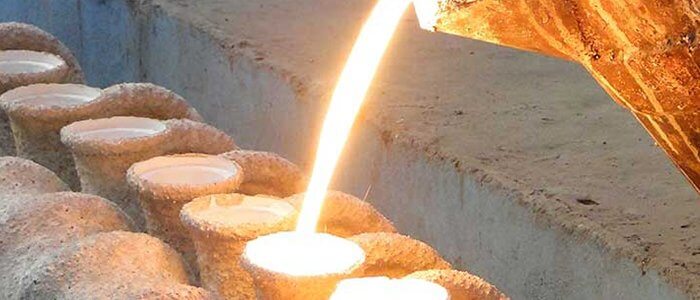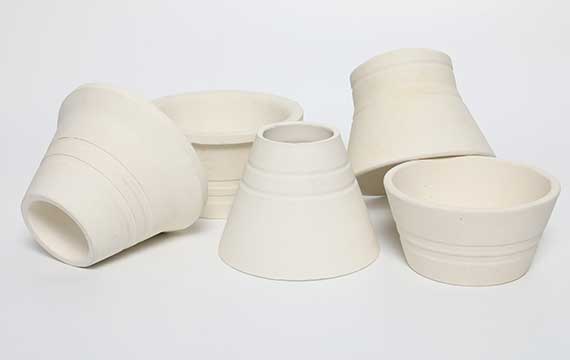Investment casting is a high-precision casting process widely used in aerospace, automobile manufacturing, industrial equipment and other fields. In this process, the pouring system is the key part that determines the quality of the casting, and the ceramic pouring cup, as an important component in investment casting, plays a role in guiding and stabilizing the flow of molten metal into the mold. This article will discuss in detail the importance of the ceramic pouring cup in investment casting from the aspects of function, material, design, application and optimization.
Function of Ceramic Pouring Cup for Investment Casting
The ceramic pouring cup is located at the inlet end of the investment casting pouring system and is the first step for the molten metal to enter the mold. Its main functions include:
Guide the flow of molten metal
The design of the ceramic pouring cup can effectively guide the molten metal into the pouring channel, ensure the smooth flow of the molten metal, and reduce turbulence and turbulence.
Reduce splashing and oxidation
The molten metal has a high temperature and kinetic energy during the pouring process. If there is no good buffering, it will cause splashing and increase the risk of oxidation of the molten metal. The ceramic pouring cup can buffer the flow rate of the molten metal, avoid splashing, and improve the surface quality of the casting through optimized design.
Impurity filtration and exhaust
Through reasonable design, the ceramic pouring cup can be installed with a filter or introduced into a buffer area to help remove impurities in the molten metal, exhaust gas, and avoid casting defects such as inclusions and pores.
Protect the mold
The ceramic pouring cup can effectively buffer the impact of the molten metal, prevent the molten metal from directly scouring the mold surface, extend the service life of the mold, and improve the yield rate of the casting.
Material characteristics of ceramic pouring cup for Investment Casting
Ceramic materials are the first choice for pouring cups for investment casting. Their excellent physical and chemical properties enable them to meet the special needs of high-temperature molten metal:
High temperature resistance
Ceramic materials have excellent high temperature resistance and can withstand the erosion and impact of molten metal (such as steel, aluminum, copper, etc.) at high temperatures.
Thermal stability
The ceramic pouring cup can maintain dimensional stability under high temperature conditions, avoid structural damage caused by thermal expansion, and thus ensure the stability of the casting process.
Chemical corrosion resistance
Ceramic materials have good chemical stability at high temperatures, are not easy to react with molten metal, and avoid impurities from contaminating castings.
Mechanical strength and thermal shock resistance
High-quality ceramic materials can withstand the impact of molten metal and have good thermal shock resistance, which can effectively avoid cracking or damage caused by sudden cooling and heating.
Key points of ceramic pouring cup design
The design of ceramic pouring cup directly affects the efficiency of the casting process and the quality of castings. The following are key factors to consider when designing ceramic pouring cups:
Capacity and size
The capacity of the pouring cup must be able to accommodate enough molten metal to meet the needs of one pouring. At the same time, the size design needs to match the cross-sectional area of the pouring channel to ensure the fluidity and stability of the molten metal.
Inner surface finish
The smooth inner surface can reduce the resistance of the molten metal flow, reduce turbulence, ensure that the molten metal flows evenly into the mold, and improve the quality of the casting.
Buffer and filter design
Designing a buffer or installing a filter at the bottom of the pouring cup can effectively filter impurities and slow down the flow rate of the molten metal, avoiding defects such as inclusions and pores in the casting.

Application scenarios of ceramic pouring cups
Ceramic pouring cups are widely used in various fields of investment casting, and their application scenarios include:
Aerospace field
In the production of high-precision castings such as aircraft engine blades, ceramic pouring cups are used to ensure the smooth flow of molten metal and avoid quality defects.
Automobile manufacturing
For the production of complex castings such as engine parts and turbocharger housings, ceramic pouring cups can improve the precision and surface finish of castings.
Industrial equipment
In the production of large castings such as pump housings and valves, ceramic pouring cups improve the strength and durability of castings by stabilizing the flow of molten metal and reducing impurities.
Directions for optimizing the design of ceramic pouring cups
Although ceramic pouring cups have shown excellent performance in investment casting, their design and performance can still be further optimized in the following ways:
Introducing composite materials
Introducing reinforcing fibers or other composite materials into ceramic materials to improve their thermal shock resistance and mechanical strength.
Optimizing shape and flow channel design
Optimizing the shape of the pouring cup through numerical simulation technology (such as CFD fluid dynamics simulation) to make the molten metal flow more stable and reduce turbulence and bubble formation.
Improved manufacturing process
Adopt advanced ceramic manufacturing process (such as 3D printing technology) to improve the dimensional accuracy and inner surface finish of the pouring cup.
Intelligent monitoring
Introduce temperature sensors or flow monitoring equipment in the actual casting process to monitor the flow of molten metal in real time and further improve the controllability of casting quality.
Conclusion
Ceramic pouring cup is an indispensable and important component in investment casting. Its design and application are directly related to the quality and process efficiency of castings. By reasonably selecting ceramic materials and optimizing the shape and function of the pouring cup, the overall performance of investment casting can be effectively improved. In the future, with the continuous development of new materials and intelligent technologies, the design and application of ceramic pouring cups will be further improved, contributing more high-quality solutions to the casting industry.


